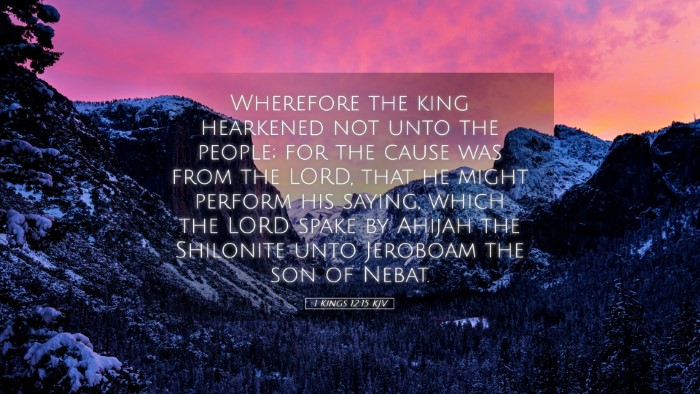Commentary on 1 Kings 12:15
In this verse, we see the ramifications of King Rehoboam's decision regarding the request of the people of Israel for relief from heavy taxation. Rather than heeding the advice of the elder statesmen, he chose to follow the counsel of his younger advisers, leading to a significant division in the kingdom.
Exegetical Insights
Contextual Background
1 Kings 12:15 states: "So the king did not listen to the people; for it was a turn of affairs brought about by the Lord, that he might fulfill his word which the Lord spoke by Ahijah the Shilonite to Jeroboam the son of Nebat." This context is crucial as it indicates not just a political decision but a divine orchestration that sets the stage for prophetic fulfillment.
Matthew Henry's Commentary
Matthew Henry emphasizes the sovereignty of God in this incident. He notes that although Rehoboam’s decision seems to stem from a place of pride and youthful arrogance, it aligns with God's divine plan. Henry asserts that the situation was intended to demonstrate the fulfillment of prophecy concerning the division of the kingdom, highlighting that God can use even human folly to bring about His plans.
Albert Barnes' Notes
Albert Barnes illustrates that Rehoboam's rejection of the people's plea reflects a broader theme of leadership failure. He suggests that Rehoboam’s refusal to gauge or empathize with the struggles of his subjects led to the fracturing of national unity. Barnes points out how leadership requires discernment and humility and that ignoring wise counsel can lead to dire consequences for both the leader and the people.
Adam Clarke's Commentary
Adam Clarke takes this verse as a critical turning point in Israel's history. He notes that Rehoboam's dismissal of the people's concerns culminated in resentment and rebellion. Clarke emphasizes that such a refusal to listen can precipitate social upheaval, illustrating the importance of governance based on justice and mercy. He also reflects on how this moment serves as a warning to contemporary leaders about the necessity of engaging with the populace with empathy and wisdom.
Theological Reflections
The Intersection of Human Choice and Divine Sovereignty
This verse invites theological reflection on the relationship between human agency and divine providence. As noted by Henry, while Rehoboam made choices that seemed reckless, these decisions were ultimately within the parameters of God’s sovereign will. Such dynamics are common throughout Scripture, encouraging readers to ponder the mystery of God's governance even amid moral failures.
- Human Responsibility: Leaders are directly responsible for their decisions and the resultant consequences.
- Divine Sovereignty: God’s overarching plan will prevail despite human failures; His sovereignty is a source of hope and assurance.
Practical Applications
Lessons for Modern Leadership
This episode serves as a profound lesson for both spiritual and secular leaders today. Rehoboam's experience demonstrates that:
- Listening is Key: Leaders must remain attuned to the needs and voices of those they lead, recognizing that wisdom often resides among the people.
- Seek Wise Counsel: Engaging with mentors and experienced advisors is crucial when making significant decisions.
- Understand Consequences: Decisions made in pride can lead to long-lasting ramifications, influencing both the leader and the community.
Cultural and Historical Significance
Historically, Rehoboam’s failure to maintain unity is echoed in various instances of leadership transition and political strife, reminding us that the principles of governance and leadership are timeless. The fracture of Israel into two kingdoms serves as a case study in the potential fragility of societal cohesion.
Conclusion
1 Kings 12:15 encapsulates a pivotal moment in Israel's narrative, marked by both a rejection of wise counsel and the underlying control of divine purposes. For pastors, students, theologians, and Bible scholars, it highlights the importance of discernment, humility, and the courage to engage with the wider community effectively. In a world where leaders are often faced with similar choices, the lessons derived from this verse remain ever relevant, serving as a reminder of the weighty responsibilities that come with leadership.


